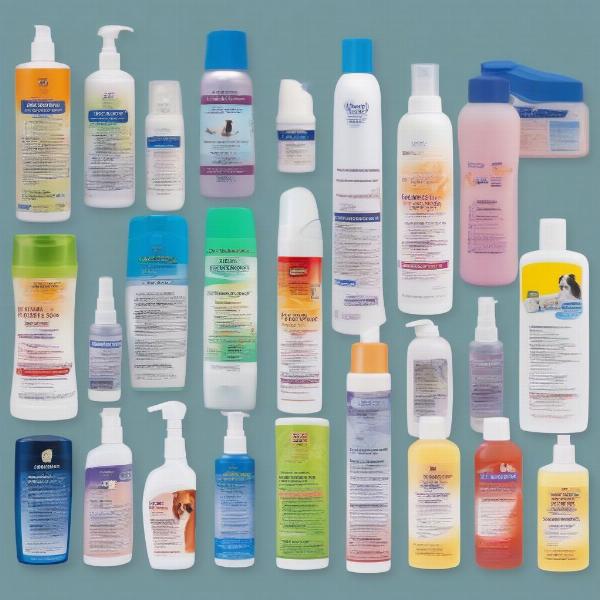Benzethonium chloride is an antiseptic and disinfectant commonly found in various dog products, especially those designed for skin issues like hot spots. Understanding its uses, benefits, and potential risks is crucial for responsible dog owners. This guide provides a comprehensive overview of benzethonium chloride for dogs, covering everything from its applications to safety precautions.
What is Benzethonium Chloride and How Does it Work in Dogs?
Benzethonium chloride is a quaternary ammonium compound known for its broad-spectrum antimicrobial activity. It works by disrupting the cell membranes of bacteria and fungi, effectively killing or inhibiting their growth. In dog products, it’s often used to cleanse and disinfect the skin, helping to manage infections and promote healing. It’s a common ingredient in hot spot sprays, shampoos, and other topical treatments.
Uses of Benzethonium Chloride in Dogs
Benzethonium chloride offers several benefits for dogs, primarily in managing skin conditions. It’s particularly effective against bacteria and fungi commonly associated with hot spots (acute moist dermatitis), a painful and irritating skin inflammation. The antiseptic properties of benzethonium chloride help to cleanse the affected area, reducing the microbial load and promoting healing. It can also be used as a general skin disinfectant, helping to prevent infections in minor cuts, abrasions, and other skin irritations.
Safety and Precautions When Using Benzethonium Chloride on Dogs
While generally considered safe when used as directed, benzethonium chloride can pose some risks if misused. Avoid contact with the eyes and mucous membranes. If accidental contact occurs, rinse thoroughly with water. Some dogs may be sensitive to benzethonium chloride, so it’s essential to monitor for any signs of allergic reactions, such as redness, itching, or swelling. If any adverse reactions occur, discontinue use and consult your veterinarian. Always follow the instructions provided on the product label.
“When using any product containing benzethonium chloride, it’s crucial to adhere to the recommended dosage and application method,” advises Dr. Emily Carter, DVM. “Overuse or improper application can lead to skin irritation or other adverse effects.”
Choosing the Right Benzethonium Chloride Product for Your Dog
Various benzethonium chloride products are available for dogs, including sprays, shampoos, and wipes. The best choice for your dog depends on the specific skin condition and your veterinarian’s recommendations. benzethonium chloride for dogs offers further information on specific products and their applications. For localized skin infections like hot spots, a spray or wipe might be suitable. For more generalized skin conditions, a medicated shampoo containing benzethonium chloride could be beneficial. Always consult your veterinarian before starting any new treatment for your dog.
Benzethonium Chloride vs. Other Antiseptics for Dogs
Benzethonium chloride is just one of many antiseptic options available for dogs. Other common antiseptics include chlorhexidine and povidone-iodine. Each antiseptic has its own spectrum of activity and potential benefits and drawbacks. hot spot spray dogs provides a comparative overview of various antiseptic options for treating hot spots in dogs. Your veterinarian can help you determine the most appropriate antiseptic for your dog’s specific needs.
 Different Antiseptic Products for Dogs
Different Antiseptic Products for Dogs
Conclusion
Benzethonium chloride can be a valuable tool in managing certain skin conditions in dogs, particularly hot spots. By understanding its uses, benefits, and potential risks, you can make informed decisions about its use for your furry friend. Always consult with your veterinarian before using any new product containing benzethonium chloride, and follow their instructions carefully.
FAQ
- Is benzethonium chloride safe for puppies? While generally safe, it’s best to consult your veterinarian before using benzethonium chloride on puppies.
- Can I use benzethonium chloride on my dog’s open wounds? Consult your veterinarian before using it on open wounds, as it may cause irritation.
- What should I do if my dog ingests benzethonium chloride? Contact your veterinarian or a pet poison control center immediately.
- How often can I use benzethonium chloride on my dog? Follow the instructions on the product label or as directed by your veterinarian.
- Can I use human benzethonium chloride products on my dog? No, always use products specifically formulated for veterinary use.
- Are there any natural alternatives to benzethonium chloride for dogs? Some natural remedies may offer similar benefits, but always consult your vet before trying any alternative treatments.
- Where can I purchase benzethonium chloride products for my dog? You can find them at pet stores, veterinary clinics, and online retailers.
About ILM Dog: ILM Dog is your trusted source for expert advice on dog care, offering comprehensive information on breeds, health, training, nutrition, grooming, and much more. We are dedicated to providing practical, reliable information to help you provide the best possible care for your canine companion. From choosing the right breed to navigating senior dog care, we cover all aspects of dog ownership. Contact us today for personalized guidance. Email: [email protected], Phone: +44 20-3965-8624.